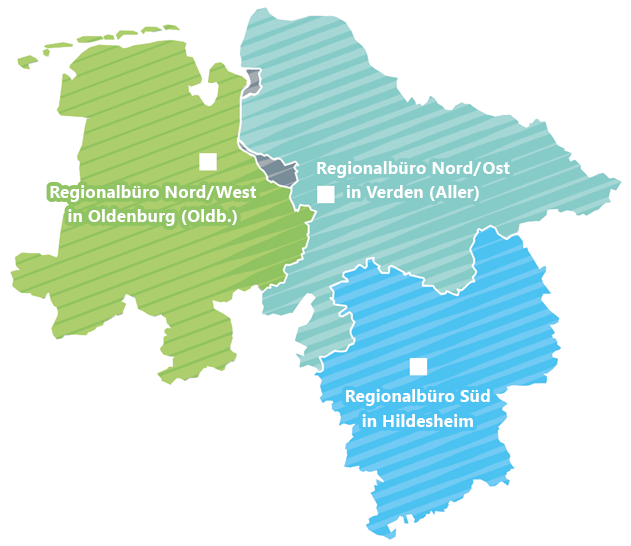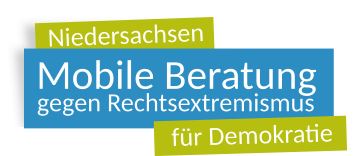What We Offer
Racism, anti-Semitism, homophobia – inhuman attitudes and incidents have long been part of everyday
life and pose permanent challenges to society. The Mobile Counseling Lower Saxony is the contact for all
those who are confronted with this ideology or who are looking for support in local democratization
processes.
The consultation is confidential, unbureaucratic, free of charge, on site and anonymous upon request. The
focus is always to “help people help themselves”. We work in a process-oriented manner and try to
strengthen the ability of the democratic parties involved to act and to network them in a demand-oriented
manner.
The racist youth coach at the local soccer club, swastika graffiti at bus stops, right-wing stickers and
graffiti in the city, or a planned march by a right-wing extremist party: the reasons that motivate people to
make use of the services of Mobile Counseling Lower Saxony against Right-Wing Extremism for
Democracy are diverse. The staff work together with the affected parties to develop solutions and support
their implementation with advice, support, and external expertise.

North/West
in Oldenburg (Oldb.)
-
nordwest@mbt-niedersachsen.de
-
Phone: 0157 32883589
-
North/East
in Verden (Aller)
-
nordost@mbt-niedersachsen.de
-
Phone: 0152 21359011
-
South
in Hildesheim
-
sued@mbt-niedersachsen.de
-
Telefon: 0152 03431429
-
Incident Report
-
Report incidents
-
in Lower Saxony to us
-
Secure and anonymous.
Idea and Concept
Our guiding principle: democratic culture as an alternative. A lively democratic and human rights-oriented
culture is a fundamental socio-political alternative to dealing with right-wing extremism, racism, anti-
Semitism and other notions of inequality. The need to create and support resilient democratic structures is
the guiding principle of Mobile Counseling. Their understanding of democracy is historically and
normatively based on humanism, anti-fascism and universal human rights. The underlying concept of
democracy is process and participation-oriented.
According to this view, democracy is a development process in which there is constant negotiation in
which society we want to live, in which as many people as possible can participate and in which citizens
also exercise their rights of freedom vis-à-vis the state. As a process, democracy in action is never
“achieved” – it is more about constantly working towards it and critically questioning current framework
conditions. Real democratic deficits in the political culture within municipalities and regions as well as
problems in coexistence must be taken into account as well as anti-democratic and inhuman attitudes in
the so-called “mainstream of society”.
Approach Based on Human Rights
This necessarily results in an attitude of the Mobile Consultants that is inextricably linked to universal
human rights and their conception of freedom, equality and dignity for all people, which have found their
echo in Article 1, paragraphs 1 and 2 of the German Basic Law. This normative framework is an integral
part of the understanding of the role of Mobile Consultants in the community and distinguishes Mobile
Counseling from other common consultation approaches.
This also means that Mobile Counseling does not take on consultation cases that obviously run counter to
the standard of human rights-oriented democratic culture. Even if Mobile Consultants act as moderators
and are accessible to all actors, they represent their own ethical point of view, derived from their
professional standards, which justifies the resolute advocacy of a human rights-based perspective in
practical work. If the needs of the consultants and the professional standards conflict with the interests of
local power structures in administration, urban society, association structures or local politics, Mobile
Counseling can also take a partisanship approach. In the interests of the consultants, intervention is then
possible – possibly in favor of minorities or marginalized democratic forces.
Mobile Counseling is also based on the Beutelsbach Consensus, which provides a framework for
emancipatory educational work with its three points of reference: prohibition of overpowering,
prohibition of controversy, and prohibition of neutrality.
Democratic Culture
Democratic culture means that if possible all those affected (participation) with their different demands
and needs (pluralism) are included in transparent discussion and opinion-forming processes
(communication). Fundamental human rights and mutual respect resulting from recognition of the
equality of all people are the indispensable framework for such a democratic culture.
Such a political culture of participation and dialogue is only possible through broad information and
transparency of decision-making structures. It follows the idea of a plural democracy, in which the
diversity of different groupings, cultures and societies do not represent a threat or a loss, but rather a gain
for a democratic community – as long as the institutional prerequisites for an exchange, as free and
comprehensive as possible, are guaranteed. From this perspective, democracy is characterized by self-
confident and active citizens who recognize other people as equals regardless of their social and cultural
background, take responsibility for the peaceful shaping of their social environment, see and address
problems to solve them together with other citizens through equal speech and joint action.
Democratic culture is endangered wherever it is not possible for all people to participate in it. Dealing
with socially marginalized groups, dominance and oppression processes as well as power and rule
structures thus become their indicators. It has limits where universal human rights are not recognized and
racist or ethnic values are propagated. A limited understanding of democracy or experiences of political
powerlessness can foster such misanthropic attitudes. Such a normatively framed and dynamically viewed
concept of democracy differs fundamentally from a static view of democracy shaped by regulatory policy,
which is derived from the theory of extremism.
Source: Bundesverband Mobile Beratung e.V .: Mobile Beratung gegen Rechtsextremismus. Inhaltliche
und methodische Grundsätze
The chairman of the board of a small garden reports that a German Reich flag is flying in a leased plot and that evening meetings are taking place at which right-wing rock music is being played. There have been isolated complaints from other members of the association, the board is aware of the problem and wants to be more capable of acting. In a joint process, the goal of the parties receiving consultation is worked out and ways in which this can be achieved. In consultations, drafts for changes to the statutes as well as a change to the house rules are worked out together. At the same time, the other members of the association are informed and transparently involved in the process. After a lengthy process involving various groups of people, those seeking consultation say that they have achieved their goal and that the measures developed will enable them to act in the long term.
Recently, a new coalition of civil society has been founded, which wants to get involved against right-wing extremism. Since the members are so far inexperienced in working in coalitions, they turn to the Mobile Counseling and ask for support. In a process moderated by Mobile Counseling, the coalition develops a self-image that is to serve as a basis for future action. Furthermore, the coalition will formulate initial goals for action and clarify responsibilities. In the future, educational events and panel discussions will be held to draw attention to right-wing structures within the region and raise public awareness of the issue. Since such events are often associated with costs, the Mobile Counseling supports the coalition by referring to funding opportunities and explaining application formalities. The coalition then applies for funding and organizes the first events, which help to make the coalition better known and to establish a local network. The parties receiving consultation state they have achieved the goal (support in setting up and structuring a coalition).
Anti-Semitic graffiti has appeared at a school, and “Jew!” is used as an insult in the schoolyard. The school social worker has noticed this. Fearing a lack of sensitivity on the part of the school administration, she initially and anonymously contacted the Mobile Counseling. Together, they analyzed the problem and made a professional assessment of the situation in order to convince the school administration team of the urgent need for action. After a successful discussion, concrete steps for action were agreed upon and implemented in a first step together with the management team and the school social work: advanced training to raise the awareness of the entire teaching staff as well as offers of empowerment for the students affected by anti-Semitism with external consultants. Subsequently, a long-term concept for dealing with anti-Semitic incidents at the school was developed.
 The association WABE e.V. has stood for non-partisan, anti-fascist, and anti-racist politics, education, and culture since 2010. The goals of the association are the promotion of tolerance, democracy, international solidarity, international understanding, and civil society engagement.
The association WABE e.V. has stood for non-partisan, anti-fascist, and anti-racist politics, education, and culture since 2010. The goals of the association are the promotion of tolerance, democracy, international solidarity, international understanding, and civil society engagement.
Article 2 of the Universal Declaration of Human Rights is a central basis of the work of WABE e.V. The confrontation with racism, sexism, and other forms of discrimination, for instance because of religion, origin, political views, language, or other status, is the focus of the educational and consultation work of WABE e.V.
WABE e.V. was founded as a support association for the Weser-Aller-Bündnis: Committed to Democracy & Civil Courage (WABE), an inter-communal network of the districts and cities of Nienburg and Verden. The municipal network was created to counteract activities of the extreme right with democratic networks and educational processes. Within the framework of the Verden – Nienburg Partnership for Democracy, WABE e.V. has taken over the sponsorship of the external coordination office and specialist department and implements educational projects for the youth.
WABE e.V. is the regional coordinator for School without Racism – School with Courage in the Lower Saxony Network and is the contact for students and schools in the districts of Nienburg and Verden.
WABE e.V. has also been active statewide since 2020 as a provider of the Mobile Counseling Lower Saxony against Right-Wing Extremism for Democracy, with regional offices in Hildesheim, Oldenburg, and Verden, and continues to strengthen the Weser-Aller region with democratic educational projects.
WABE e.V. is recognized by the Verden revenue office as a non-profit organization and an independent youth welfare service agency by the state of Lower Saxony.
WABE e.V.
Holzmarkt 15
27283 Verden
+494231 / 12-456
E-mail: info@wabe-info.de
Links
Advocacy for those affected in Lower Saxony [EN] – Contact point for victims of right-wing, racist and anti-Semitic violence in Lower Saxony.
RIAS Lower Saxony [GER] – Research and Information Center on Anti-Semitism (RIAS) Lower Saxony.
BMB – Federal Association Mobile Counseling [GER] – Federal association of Mobile Counseling against right-wing extremism in all German states.
Civil Society Exit Counseling in Lower Saxony – Regional Office North/West Distance [GER]
State Democracy Center Lower Saxony [GER] – The L-DZ is responsible for implementing the federal program “Democracy in Action!” in Lower Saxony.
WABE e.V. [GER] – The sponsoring association of Mobile Counseling is the Weser-Aller-Bündnis: Committed to Democracy & Civil Courage.
The consultation is confidential, unbureaucratic, free of charge, on site and anonymous upon request. The
focus is always to “help people help themselves”. We work in a process-oriented manner and try to
strengthen the ability of the democratic parties involved to act and to network them in a demand-oriented
manner.
The racist youth coach at the local soccer club, swastika graffiti at bus stops, right-wing stickers and
graffiti in the city, or a planned march by a right-wing extremist party: the reasons that motivate people to
make use of the services of Mobile Counseling Lower Saxony against Right-Wing Extremism for
Democracy are diverse. The staff work together with the affected parties to develop solutions and support
their implementation with advice, support, and external expertise.
North/West
in Oldenburg (Oldb.)
-
nordwest@mbt-niedersachsen.de
-
Phone: 0157 32883589
-
North/East
in Verden (Aller)
-
nordost@mbt-niedersachsen.de
-
Phone: 0152 21359011
-
South
in Hildesheim
-
sued@mbt-niedersachsen.de
-
Telefon: 0152 03431429
-
Project Lead
-
info@mbt-niedersachsen.de
-
Phone: 01797281404
-
